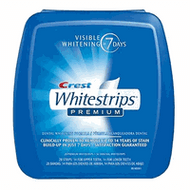Smile, You’re in the Dental Care Isle
Mar 13th 2023
ONE thing I've been genetically blessed with is good teeth. Lousy eyes,
but great pearly whites. So maybe that's why I was slow to catch on to
the oral hygiene revolution overtaking this country.
Powered
toothbrushes that sell for more than $100. Whiteners. Mouthwashes that
do double duty by preventing cavities or controlling tartar or
gingivitis. Toothpaste in every conceivable flavor.
"People want teeth like Chiclets," said Katie L. Dawson, president of
the American Dental Hygienists' Association and a clinical hygienist for
the last 30 years. The makeover shows, she thinks, are a large part of
the reason oral hygiene - especially whitening - has become so popular.
As
dental care has started moving from being a necessary but boring chore
to another way to be glamorous, more and more products are moving onto
shelves.
A visit to the toothbrush aisle in the neighborhood
drugstore has become a long, drawn-out affair. For consumers, confusion
abounds about what to buy, and whether, in fact, most of these items are
essential.
"It's mind-boggling - you need an advanced degree,"
said Carol Hall of Pelham, N.Y. "There's been a baffling product
explosion. There's toothpaste with whitening, toothpaste with cavity
prevention. And if you want to get me crazy, talk about toothbrushes. I
stick with manual toothbrushes, and even that's confusing. I'll come
home with what I think is a deal on toothbrushes, and then I open them
and realize I bought extra-long medium, not extra-long soft."
No
wonder consumers are bewildered. According to the Datamonitor
Productscan Online database, which monitors the introduction of
products, 112 new toothpastes were sold in 2004. Figures from
Intelligent Resources Inc. show that Americans spent $1 billion worth on
toothpaste over the last 52 weeks, $439.7 million on manual
toothbrushes and $194.6 million on powered toothbrushes. That number
includes drugstores and supermarkets, but excludes Wal-Mart.
Dr.
Kimberly Harms, consumer adviser for the American Dental Association and
a dentist in Farmington, Minn., knows that people are perplexed,
saying, "We call it the dental aisle of confusion."
She suggests
that patients ask their dentists during regular checkups what is
essential for oral hygiene and what is unnecessary. Do they have a lot
of tartar buildup? Do they have sensitive teeth? Pick the products that
address specific needs.
The first thing is to make sure the toothbrush can be held comfortably, whether it is manual or powered.
Then brush longer - most dentists recommend two minutes - and well enough to do the job.
"All you really need is a manual toothbrush, a bit of floss and some time," Dr. Harms said.
So
why do I feel I am missing something by not buying the IntelliClean
System from Philips Sonicare and Crest, which retails for around $130?
Introduced earlier this year, it is a toothbrush that pumps liquid
toothpaste directly onto the bristles before and during brushing. It
also has a signal every 30 seconds to move to another quadrant of the
mouth, and a two-minute timer. It also, according to news releases,
brushes three times faster than other leading power toothbrushes.
On the other hand, that much dental hygiene before bedtime might make it hard to get to sleep.
The
fact is, although people may love their high-powered toothbrushes,
there is no evidence that they do a better job than manual ones.
Earlier
this year, the Cochrane Collaboration, a British-registered nonprofit
organization focusing on health care, released a review of 42 trials
comparing the two types of toothbrushes.
"In most cases, manual
toothbrushes remove as much plaque as their expensive electronic
counterparts, and protect just as well against inflamed gums," the
researchers said in the report.
The only exceptions were electric
toothbrushes with rotating-oscillating heads, which rotate in one
direction and then another; these did prove to be more effective.
Experts
say powered toothbrushes may be good for people who have arthritis or
problems with manual dexterity, or for those who rush through their
brushing.
"The results show that many people may be wasting money
on toothbrushes they believe will clean their teeth better, when
actually a much cheaper traditional brush would do the job just as
well," the summary of the report states.
Dr. Harms, as it turns
out, has a mixed marriage - she uses a manual toothbrush, while her
husband swears by his expensive electric one.
No toothbrush, she
said, can get between teeth, no matter what the advertisers say, and
that is why flossing is necessary (and not just the day or two before a
dental visit, which I've been known to do).
As dental care is
moving from being a boring chore to another way to be glamorous, more
and more products are moving onto shelves.
Ultra-White whitening offers the best teeth whitening products that you can use in your own home. Get Ultra Teeth Whitening
and your bright white smile is only a few days away. Our product works
so well we unconditionally guarantee your total satisfaction.
Courtesy New York Times

